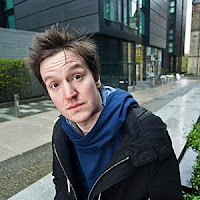You may wonder why we in Dumfries and Galloway are such a cheerful lot, given we've got one and a half million tons of unexploded munitions sitting off the coast and two sides of the same scone for our elected representatives. I wonder myself sometimes, and here's Katy Ewing to darken the mood further by recalling a previous plague in the region, Foot and Mouth Disease. Never mind, no misery no poetry: 'Le bonheur écrit a lencre blanche sur des pages blanches' as Montherlant said before shooting himself in the heid.
2001 saw the UK's worst ever outbreak and Dumfries and Galloway was one of the worst affected parts. In total about 1,500 farms lost 750,000 animals, culled. Folk recall having to scrub their windows daily as they were coated with grease, fat from the burning animals. ‘It was a most appalling situation to find yourself in in Britain', someone told me at the time, 'you just didn’t expect it – the Army breaking peoples’ doors down to slaughter their stock’. Seems appropriate then, in the midst of one emotional trauma, to remember another.
She often writes about remembered place, childhood and motherhood and frequently finds herself drawn to the dark and uneasy places in human experience. Katy's writing is deft, deceptively simple and packs a real punch.
Here she reads 'Two Thousand and One':
Link to Bearings:
https://poetsrepublic.org/product/bearings-1-joy-hendry-katy-ewing/
Katy Reading 'Friday the Nineteenth':
https://poeticpoliticsconference.wordpress.com/2016/10/12/friday-the-nineteenth-by-katy-ewing/
Two Thousand and One
Our second beautiful baby girl
was born in April, fat and pink and healthy,
but would not gain weight.
“Failure to thrive”, the notes declared
in hurried and embarrassed black biro,
but anyone could see she wanted to live;
bright eyes, she smiled, she laughed, she learned,
but she grew longer, got thinner, looked starved.
We could hardly see it then,
what the few photos show.
Gentle midwives became watchful health visitors,
concern turning their eyes from mine,
though they couldn’t tell me what I was doing wrong.
The scales, which four years earlier
had always been a scene of great proud news,
became a cold, hard place of fear
and bright red screams of injustice.
Innocent sheep were burned that spring,
in barbaric heaps, rank smoke pouring
from fields as we drove past.
Walkers had to step through iodine footbaths,
and while the countryside was no-go
we frantically tried to nourish our own, stay hopeful.
The answering machine on a sunny summer’s day,
dad shaken like I’d never heard him,
and mum fallen from the high farm-house roof
onto the cobbled courtyard,
blinded and broken, small as I’d never seen her,
imprisoned in a crisp white hospital bed,
desperate to escape.
Recovery seemed slow and difficult,
the future hard won.
By the time the towers fell in autumn;
a T.V. show on every channel
too shocking to seem real,
and the end of the world seemed closer than ever,
our year’s wounds had already rendered us numb.
Link to Bearings:
https://poetsrepublic.org/product/bearings-1-joy-hendry-katy-ewing/
Katy Reading 'Friday the Nineteenth':
https://poeticpoliticsconference.wordpress.com/2016/10/12/friday-the-nineteenth-by-katy-ewing/
Two Thousand and One
Our second beautiful baby girl
was born in April, fat and pink and healthy,
but would not gain weight.
“Failure to thrive”, the notes declared
in hurried and embarrassed black biro,
but anyone could see she wanted to live;
bright eyes, she smiled, she laughed, she learned,
but she grew longer, got thinner, looked starved.
We could hardly see it then,
what the few photos show.
Gentle midwives became watchful health visitors,
concern turning their eyes from mine,
though they couldn’t tell me what I was doing wrong.
The scales, which four years earlier
had always been a scene of great proud news,
became a cold, hard place of fear
and bright red screams of injustice.
Innocent sheep were burned that spring,
in barbaric heaps, rank smoke pouring
from fields as we drove past.
Walkers had to step through iodine footbaths,
and while the countryside was no-go
we frantically tried to nourish our own, stay hopeful.
The answering machine on a sunny summer’s day,
dad shaken like I’d never heard him,
and mum fallen from the high farm-house roof
onto the cobbled courtyard,
blinded and broken, small as I’d never seen her,
imprisoned in a crisp white hospital bed,
desperate to escape.
Recovery seemed slow and difficult,
the future hard won.
By the time the towers fell in autumn;
a T.V. show on every channel
too shocking to seem real,
and the end of the world seemed closer than ever,
our year’s wounds had already rendered us numb.
The Minister’s Pool
It wasn’t just the downhill run,
flung flying along the wooded path,
that pulled us to the river every summer
as soon as the trees wore soft green,
wild garlic flowered, the sky as blue as mattered.
The water shocking, but survivable with many tries,
or one brave plunge.
It wasn’t just the life-thick cold current that tugged us,
kept trying to drag us to the pool
across the shallows
from our chest-deep swimming place.
The safe place, where soft weed and slippy algae
cushioned stones for our timid feet
that curious minnows nibbled, tickled.
The edge was never far.
It wasn’t just the lurking corner whirlpool of local lore
that scared the swimming power right out of me,
the pool’s depth renowned, greater with every telling.
The cold like a spell to pull me fish-deep,
as I gasped and fought to keep the surface,
the dark concealing primal fears, unspeakable
but with a stronger lure than adults’ warnings
could hold me from.
It wasn’t just its safety
that drew you to the sandstone ledge you’d reach
if you dared to cross and push and pull
yourself right out the sucking water
into the shadow of the massive, ancient,
overhanging oak tree, to seek a warm spot.
Exhausted, weed-specked,
heavy as a new-born.
(Reprinted from 'Stravaig')
(Reprinted from 'Stravaig')















